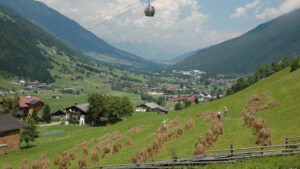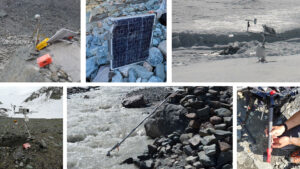Abstract/Description
In response to the accelerated retreat of mountain glaciers and the increasing incidence of natural hazards, innovative geoengineering strategies are critical to mitigating environmental risks and enhancing ecosystem resilience. Naue GlacierProtect, based on Secutex® Green G1 – a fully biodegradable, mechanically bonded nonwoven geotextile made entirely from renewable organic fibers – offers a promising, sustainable alternative to conventional synthetic solutions. Its biodegradability ensures that when it decomposes, the material is completely converted to biomass, CO2 and water, leaving no harmful residues. In addition, it actively promotes microbial and fungal activity, which is critical for nutrient cycling and glacier integrity.
The material exhibits high UV reflectivity and robust thermal insulation properties, effectively delaying glacier and snow melt and stabilizing glacier surfaces. In contrast to conventional polypropylene fabrics which are used for glacier cover and that are found to release persistent microplastics, this biobased and biodegradable solution supports natural ecological functions and adheres to eco-design principles throughout its lifecycle. A cradle-to-gate Environmental Product Declaration, conforming to EN 15804 standards and incorporating life cycle assessment of production (A1–A3) and end-of-life (C1–C4) phases, indicates a Global Warming Potential of only 2.67 kg CO₂ eq per m², with raw material extraction accounting for the majority of the impact. This low overall impact compares favorably with conventional synthetic alternatives. Its applications in glacier protection, snow farming, and alpine infrastructure protection are in line with Sustainable Development Goals 6, 9, 12, and 13.
This balanced approach, combining environmental protection with infrastructure development, demonstrates a scalable, repeatable strategy for nature-based geoengineering. Ultimately, Naue GlacierProtect represents a forward-looking solution for mitigating climate risks and promoting sustainable development in fragile mountain environments. By integrating materials science with ecological knowledge, this approach not only protects glaciers but also sets a new standard for sustainable geoengineering practices.


